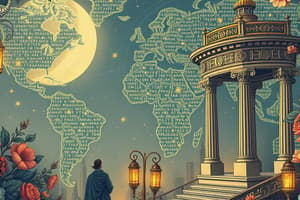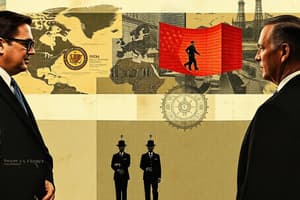Podcast
Questions and Answers
What are some negative implications of globalization mentioned in the discussion?
What are some negative implications of globalization mentioned in the discussion?
- Cultural exchange and diversity
- Strengthened international cooperation
- Facilitation of drug cartels and terrorists (correct)
- Increased economic growth
How does globalization influence individual perspectives on world politics?
How does globalization influence individual perspectives on world politics?
- It simplifies complex geopolitical concerns.
- It enables a uniform global opinion on issues.
- It eliminates personal biases in understanding events.
- It connects individual social positions to broader political narratives. (correct)
What aspect of global politics does globalization potentially personalize?
What aspect of global politics does globalization potentially personalize?
- Responses based on individual identities and experiences (correct)
- International treaties and agreements
- Personal views regarding travel restrictions
- Global warming debates
Which statement best describes the dual nature of globalization as discussed?
Which statement best describes the dual nature of globalization as discussed?
What is a critical angle to consider when analyzing world events in the global era?
What is a critical angle to consider when analyzing world events in the global era?
What requirement does globalization impose on the analysis of local communities?
What requirement does globalization impose on the analysis of local communities?
What factor is suggested to shape how globalization is perceived by an individual?
What factor is suggested to shape how globalization is perceived by an individual?
Which of the following best encapsulates the role of the internet in the context discussed?
Which of the following best encapsulates the role of the internet in the context discussed?
What was one primary goal of founding the Department of International Politics after the First World War?
What was one primary goal of founding the Department of International Politics after the First World War?
What is one area of study that is not traditionally considered a subfield of International Relations?
What is one area of study that is not traditionally considered a subfield of International Relations?
How has the discipline of International Relations been described in relation to its history?
How has the discipline of International Relations been described in relation to its history?
Which field is noted as having the greatest influence on International Relations in the post-Second World War period?
Which field is noted as having the greatest influence on International Relations in the post-Second World War period?
What is one of the contentious key concepts organizing debate in International Relations?
What is one of the contentious key concepts organizing debate in International Relations?
Which journal was the first in the field of International Relations?
Which journal was the first in the field of International Relations?
What belief significantly influenced the emergence of International Relations during the early twentieth century?
What belief significantly influenced the emergence of International Relations during the early twentieth century?
What is one of the diverse fields from which International Relations draws theoretical and methodological traditions?
What is one of the diverse fields from which International Relations draws theoretical and methodological traditions?
What do liberals believe about sovereignty in practice?
What do liberals believe about sovereignty in practice?
What is a core belief of liberal internationalism?
What is a core belief of liberal internationalism?
Which of the following is NOT associated with liberal thought?
Which of the following is NOT associated with liberal thought?
Realists contend that which aspect of world politics is most significant?
Realists contend that which aspect of world politics is most significant?
What historical context contributed to the development of liberal internationalism?
What historical context contributed to the development of liberal internationalism?
How do realists view their intellectual lineage compared to liberals?
How do realists view their intellectual lineage compared to liberals?
In the context of globalization, how do liberals view state autonomy?
In the context of globalization, how do liberals view state autonomy?
Which concept underscores the significance of both material and non-material factors in liberal thought?
Which concept underscores the significance of both material and non-material factors in liberal thought?
Flashcards
International Relations (IR)
International Relations (IR)
The study of interactions between countries and other actors on the global stage.
Key Concepts in IR
Key Concepts in IR
Core ideas that shape the field, including power, violence, sovereignty, and states.
Subfields of IR
Subfields of IR
Different areas of specialization within International Relations, such as international security and international political economy.
International History
International History
Signup and view all the flashcards
Interdisciplinary
Interdisciplinary
Signup and view all the flashcards
Origins of IR
Origins of IR
Signup and view all the flashcards
Influence of History
Influence of History
Signup and view all the flashcards
Influence of Political Science
Influence of Political Science
Signup and view all the flashcards
Globalization's Impact
Globalization's Impact
Signup and view all the flashcards
Globalization's Perspective
Globalization's Perspective
Signup and view all the flashcards
Global Politics' Reflection
Global Politics' Reflection
Signup and view all the flashcards
Globalization's Nature
Globalization's Nature
Signup and view all the flashcards
International Relations History
International Relations History
Signup and view all the flashcards
International Political Thought
International Political Thought
Signup and view all the flashcards
Globalization's Impartiality
Globalization's Impartiality
Signup and view all the flashcards
Personal Impact of Globalization
Personal Impact of Globalization
Signup and view all the flashcards
Liberal Internationalism
Liberal Internationalism
Signup and view all the flashcards
Realism
Realism
Signup and view all the flashcards
Globalization
Globalization
Signup and view all the flashcards
Sovereignty
Sovereignty
Signup and view all the flashcards
Interdependence
Interdependence
Signup and view all the flashcards
International Relations Theory
International Relations Theory
Signup and view all the flashcards
IR Theory Value
IR Theory Value
Signup and view all the flashcards
World Politics
World Politics
Signup and view all the flashcards
Study Notes
Introduction: From International Politics to World Politics
- This book provides a comprehensive overview of world politics in a global era.
- The term "globalization," frequently used to describe contemporary world politics, is controversial.
- Debate exists about its meaning, whether contemporary world politics differs from the past, and the extent of backlash against neoliberal globalization.
- Globalization can be described as increasing interconnectedness among societies, where events in one region impact others.
- Some view globalization as an ideology associated with neoliberal capitalism, shaping world politics since the late 1970s.
- The book will address how globalization is approached, and offer arguments for and against it as a significant development.
The Study of International Relations
- International Relations (IR) is a multifaceted field studying global issues like environmental problems, war and peace, global economics, and inequality.
- Key concepts in IR include power, violence, sovereignty, states, empire, inequality, justice, and democracy.
- The field has multiple subfields and specialisms (e.g., international history, security, political economy), often regionally focused.
- IR is highly interdisciplinary, drawing on theories and methods from various fields (e.g., history, law, political science, sociology).
- The discipline emerged more recently, after World War I, linked with the aspiration to prevent future conflicts.
- Early emphasis was on understanding the causes of war.
- Some scholars trace the origins of academic IR to 1919 at the University of Wales, Aberystwyth.
- Others question this narrative, tracing the field's roots further back to colonial administration studies and imperialism.
- The discipline has been criticized for its predominantly Eurocentric focus and neglecting non-Western histories and experiences.
Theories of World Politics
- Understanding contemporary world politics requires a framework to prioritize key issues and connect them.
- Theories in IR like liberal internationalism, realism, Marxism, constructivism, poststructuralism, postcolonialism and feminism offer varying perspectives on globalization.
- Each theory offers different understandings of causality and the nature of power in global relations.
- Liberal internationalism emphasises global interconnectedness, progress, and the potential for cooperation, while realism focuses on state power and conflict.
- Marxism sees world politics as shaped by class struggle and economic inequalities.
- Constructivism considers how ideas and norms shape actors' identities and interests, while postmodernism emphasizes the role of language and discourses in shaping knowledge and reality.
- Postcolonial perspectives critique Eurocentric frameworks for analyzing globalization.
Theories and Globalization
- Various theories explain globalization differently.
- Liberals view it as progressive and interconnected, with states losing central importance.
- Realists see globalization not altering the fundamental power struggle among states.
- Constructivists focus on how ideas and norms shape globalization.
- Marxists see it as neoliberal capitalism serving existing class inequalities.
- Theories debate whether globalization is a new or ongoing process, and if it promotes or undermines social change.
Globalization: Myth or Reality?
- Globalization is a complex concept, debated for being oversimplified or misrepresenting its complexities.
- Some argue it’s a new phase of world politics, characterized by increased interconnectedness and dependence.
- Others criticize it for simply continuing previous patterns of globalization, arguing it's primarily a continuation of historical trends.
Feminism, Realism, Liberalism, Postcolonialism
- Feminists examine how gender shapes and is shaped by globalization, highlighting issues like gender inequality in global power relations.
- Realists prioritize state power and the struggle for dominance in international relations, considering globalization a factor in the global balance of power.
- Liberals highlight interdependence and cooperation, analyzing how globalization affects states’ interactions.
- Examining how the histories of colonialism, postcolonialism, and race shape global power imbalances, and international relations.
Studying That Suits You
Use AI to generate personalized quizzes and flashcards to suit your learning preferences.




